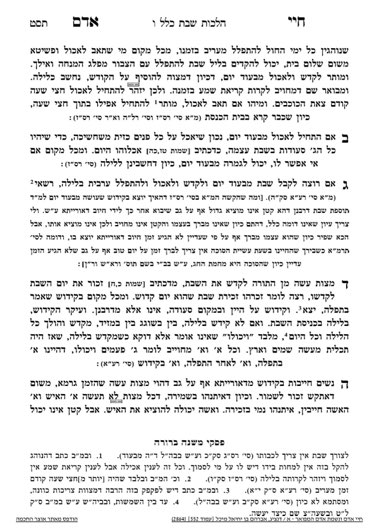The current series, which will cover Maariv on Friday night and Kiddush, is available for sponsorship. Please contact Rabbi Reingold for more information.
We are continuing in siman 1, where the Chayei Adam is discussing davening maariv before tzeis hakochavim on Friday night. Yesterday, we learned that although one is allowed to daven early (after plag hamincha) on Friday night, they cannot begin their seudah within 30 minutes of tzeis, because they will be starting a seudah within 30 minutes of their chiyuv kriyas shema.
The Chayei Adam clarifies that if one is hungry, it is muttar to begin within the 30 minutes before tzeis, because one already recited shema in shul. The question is that when one recited kriyas shema in shul, it was too early so they were not yotzei. How does it help to have recited shema in shul?
Most rishonim assume that although Rebbi Yehuda assumes one can daven maariv from plag and onwards, kriyas shema is dependent on beshochbecha u’vkumecha, when people wake up and go to sleep. People do not say that since, according to Rebbi Yehuda, it is considered nightfall, they should go to sleep. Thus, it is not a zman shechiva (a time for sleeping), so even Rebbi Yehuda agrees that one is not yotzei if they recite shema during this time.
However, Rabbeinu Tam understands that, according to Rebbi Yehuda, one is yotzei kriyas shema in shul from after plag hamincha. We do not rely on Rabbeinu Tam, because most rishonim disagree with Rabbienu Tam, and it could be we do not even pasken like Rebbi Yehuda. Nevertheless, the Chayei Adam holds that regarding the issur derabanan of beginning a meal within 30 minutes of the zman kriyas shema, one can rely on the Rabbeinu Tam that they have already recited shema and been yotzei the mitzvah deoraysa, at least with considerations of shalom bayis and so on. It is inappropriate that one be hungry and not eat on Shabbos, as it goes against the mitzvah of oneg Shabbos.
On the other hand, there may be scenarios in which one should be makpid, such as if they are not hungry or not in a rush.
If a person has guests, if they are poor, the Chafetz Chaim writes that one may transgress the issur of lo sikpotz es yadecha, closing your hand to the poor if they do not feed the guests immediately even though you will eventually give them. If so, by pushing the meal off to keep the mitzvah derabanan, one may be pushing away an issur deoraysa.
In siman 2, the Chayei Adam discusses one who accepts Shabbos early. He writes that even if one finished their seudah before tzeis hakochavim, it is appropriate to eat an additional kezayis after tzeis as well. He explains that this way, the meal takes place on Friday Night proper. The pasuk says ichluhu hayom, eat it on this day! Nevertheless, if one needs to eat early, one may do so, because we consider it Shabbos
Although the Taz records this chumra, the Magen Avraham disagrees with it, and holds it is considered Shabbos.
Summary
- One should not begin a seudah with 30 minutes of the zman kriyas shema.
- Nevertheless, one may rely on the opinion that one can recite kriyas shema after plag, when one has difficulty to wait.
- The Taz holds that if one begins s seudah before tzeis, they should eat a kezayis after tzeis. The Magen Avraham disagrees.



